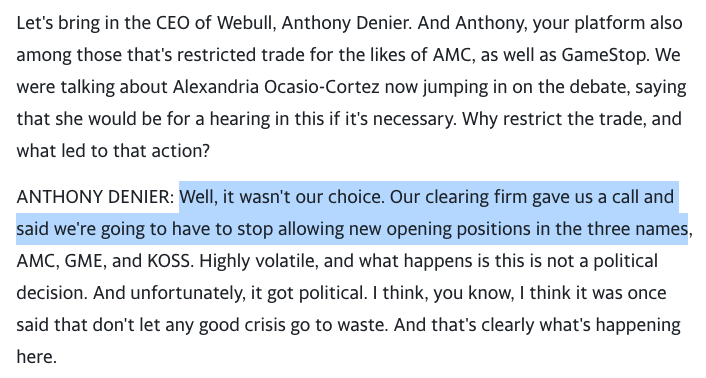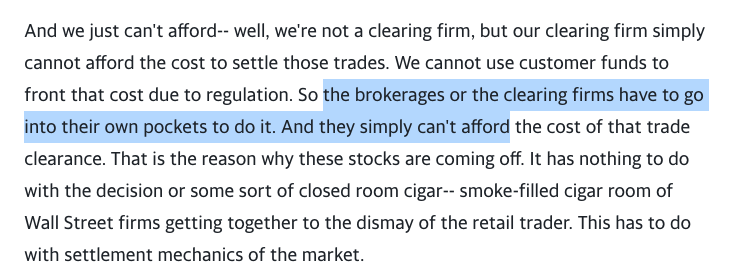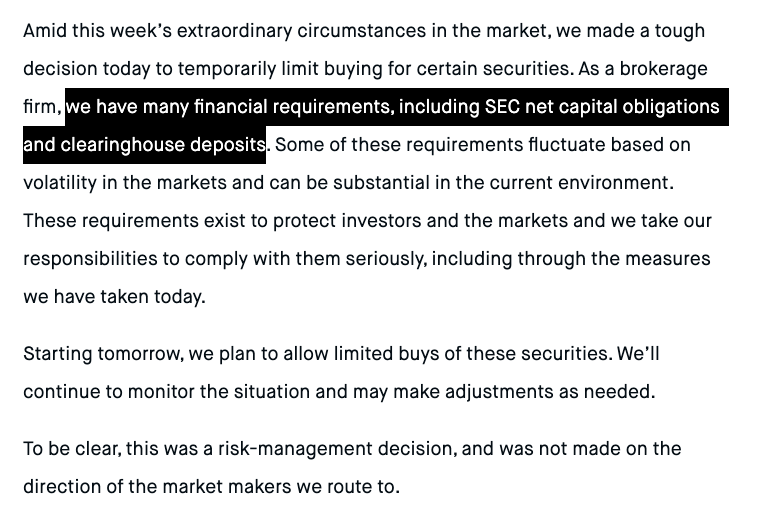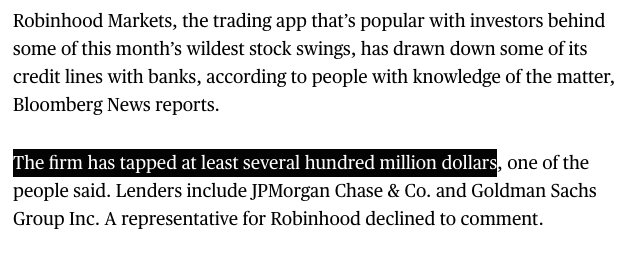
We don’t know all the facts yet. It is quite possible Robinhood was leaned on by the SEC, a banking partner, or one of many other regulators / regulated entities they are beholden to.
We’re seeing the limits of fintech vs crypto in real-time. Not your rails, not your stocks.
We’re seeing the limits of fintech vs crypto in real-time. Not your rails, not your stocks.
https://twitter.com/fritzanity/status/1354832717284741130
OK, here *may* be why Robinhood & other brokerages shut down trading.
Not because evil. Because they can't afford the cost!
Due to the volatility of these stocks, their partners now (understandably) want cash up front. No one wants to be holding the bag. finance.yahoo.com/video/heres-wh…


Not because evil. Because they can't afford the cost!
Due to the volatility of these stocks, their partners now (understandably) want cash up front. No one wants to be holding the bag. finance.yahoo.com/video/heres-wh…



This is plausible to me & similar to the kinds of thing that happen in crypto when there is an unexpected surge in price.
If true, it's a supply chain issue due to slow settlement times. No one wants to take principal risk on a ton of highly volatile assets.
If true, it's a supply chain issue due to slow settlement times. No one wants to take principal risk on a ton of highly volatile assets.
See statements below.
Robinhood seems to have run low on credit due to this insane surge, and would have needed to go long on $X00M worth of GME. Way too risky given guaranteed eventual drop. So they shut it down.
1) bloomberg.com/news/articles/…
2) blog.robinhood.com/news/2021/1/28…

Robinhood seems to have run low on credit due to this insane surge, and would have needed to go long on $X00M worth of GME. Way too risky given guaranteed eventual drop. So they shut it down.
1) bloomberg.com/news/articles/…
2) blog.robinhood.com/news/2021/1/28…


@RobinhoodApp hasn't tweeted this, but they should!
> we have many financial requirements...these requirements fluctuate based on volatility...and can be substantial in the current environment
Very reasonably, they didn't want to be holding the bag
blog.robinhood.com/news/2021/1/28…
> we have many financial requirements...these requirements fluctuate based on volatility...and can be substantial in the current environment
Very reasonably, they didn't want to be holding the bag
blog.robinhood.com/news/2021/1/28…
The settlement issue also illustrates the limits of fintech.
Fintech is a shiny (and useful) frontend on top of an antiquated backend. Crypto is the new backend.
With crypto, you can settle on-chain in minutes, in any country, for large amounts. Many settlement issues go away.
Fintech is a shiny (and useful) frontend on top of an antiquated backend. Crypto is the new backend.
With crypto, you can settle on-chain in minutes, in any country, for large amounts. Many settlement issues go away.
Customers expect fintech apps to be as “instant” as consumer internet, & companies work hard to make them feel like that.
But the lowest level APIs are still things like SFTP for ACH. And don’t work under unexpected load. Seems like what happened here. news.ycombinator.com/item?id=150954…
But the lowest level APIs are still things like SFTP for ACH. And don’t work under unexpected load. Seems like what happened here. news.ycombinator.com/item?id=150954…
Confirmed. Robinhood (& other brokerages) had a cash crunch due to the details of how settlement works. They had to sell equity & dip into their own pockets to re-enable trading.
This is a technology issue which we can solve by legalizing security tokens.
archive.is/n83fV
This is a technology issue which we can solve by legalizing security tokens.
archive.is/n83fV

Yes, but under pressure by regulators/customers, and boxed in by laws/NDAs, @vladtenev may not have been *able* to say the SEC and/or DTC made them shut down trading.
Other brokerages also shut down but as the consumer brand RH got the blame. They also had to raise $1B in a day.
Other brokerages also shut down but as the consumer brand RH got the blame. They also had to raise $1B in a day.
https://twitter.com/zackkanter/status/1355042479314112513
• • •
Missing some Tweet in this thread? You can try to
force a refresh




